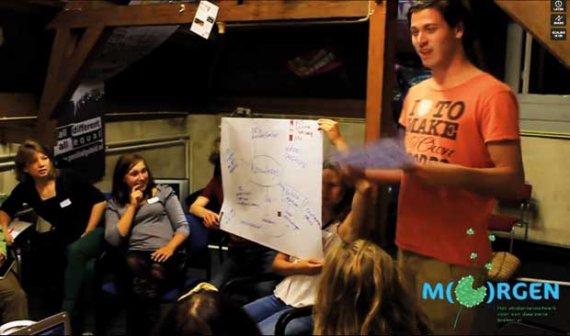On 10 October, Sustainability Day, they presented their manifesto containing ten points. ‘We want to gain the knowledge and skills to bring about a green society,’ they write. Wageningen MSc student Anneke Rooth helped write the manifesto, which comes from the sustainable student organization Morgen [Tomorrow]. ‘About 20 students spent an evening brainstorming,’ Rooth explains. And this produced ‘a lot of points’, which were eventually whittled down to ten key issues. The question is whether a manifesto of this kind is going to help? Rooth thinks it will. ‘Before this I did teacher training in Tilburg. If you wanted to find out more about sustainability you had to work hard. Looking for the right people, searching on websites until you found just that right link.’ This could be improved on, and students should come across that information more as a matter of course. About 2500 students in the Netherlands have signed the manifesto. The executive boards of 11 educational institutions have received it ‘with enthusiasm’. Wageningen is not among them yet, but Morgen will be presented its manifesto here later. ‘You would think Wageningen was already sustainable,’ says Rooth. ‘But apparently this is still a bridge too far.’ The university has said it sees this as a sympathetic initiative but wants to read the contents carefully before giving its response. The executive board believes the university already meets most of these demands but would be happy to meet the Wageningen initiators of the manifesto.
The ten points in a nutshell
- Embed sustainability into the curriculum of every degree programme.
- Train teachers so that they can integrate sustainability into their work.
- Make the competency of ‘systems thinking’ an integral part of every programme.
- Support students in initiatives, internships or theses related to sustainability.
- Create an interdisciplinary institute to work and teach courses on a sustainable society.
- Give a sustainability module in the first year which provides a basic knowledge of the principles of People, Planet and Profit.
- Pay attention to the history and the future of your own subject area from the sustainability perspective.
- Make at least one of the main practical projects on each programme sustainable in focus.
- Compare higher education institutes annually in terms of sustainable business management, education and research through an independently appointed committee.
- Mention sustainability-related achievements on the degree certificates of students who have demonstrably studied sustainable development in some depth.

